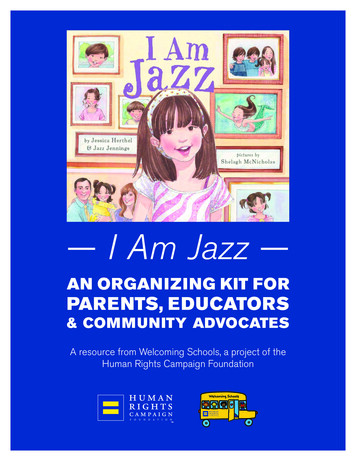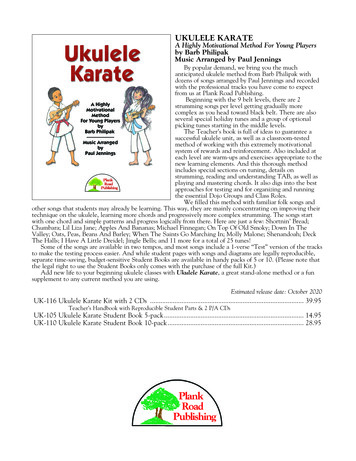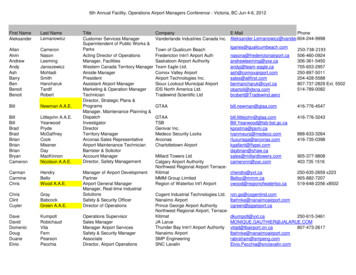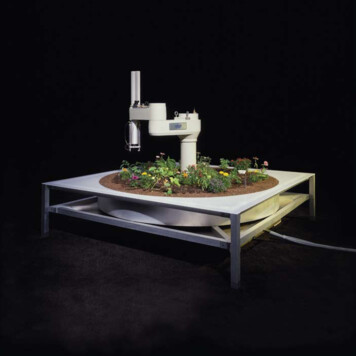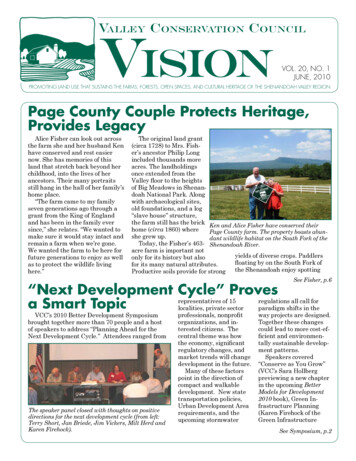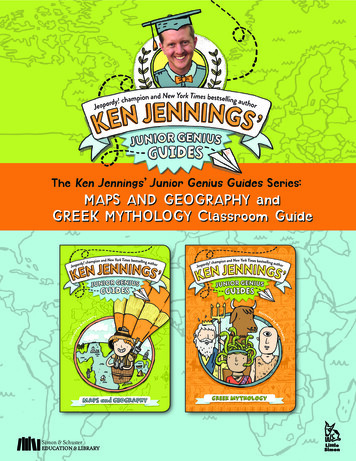
Transcription
The Ken Jennings’ Junior Genius Guides Series:MAPS AND GEOGRAPHY andGREEK MYTHOLOGY Classroom Guide
DIRECTIONS ON HOW TO HOLD AN EVENT INYOUR CLASSROOMUsing True/False or Multiple Choice questions: These questions can all be used as a game with individuals or teams, dependingon your class and how you would like to set it up. Either the teacher, or an assigned student, can read the question. Have everyone record their answer, whether individually or as a team. Allow a short time forthought, or for discussion within a team. To use the game as a “teaching moment” the answers have been provided. So oncethe question has been read, and answers recorded, then give the correct answer tothe class.it will help everyone remember the correct answer! As a fun reward, the “Junior Genius” can be awarded the chance to be the reader foryour next event!GAMESThere are thousands of factoids throughout Ken Jennings’ Junior Genius Guides. Tomake those factoids work for you in your classroom, we have created three quiz gamesfor you to play. The first two games are True or False quizzes, and the second two are“Who Wants to Be a Junior Genius?” multiple-choice games. There are many more factsavailable in the Maps and Geography and Greek Mythology books than are providedin these games, so you can also make up your own questions, using those provided asa model. Finally, in honor of author Ken Jennings’ achievement as all-time-great winneron the game show Jeopardy!, we have included two Junior Genius Jeopardy! games. All ofthese games can be used in a variety of ways—at school, at a Junior Genius Club meeting,book club, Scout meeting, or geography club.These games correlate with the following Common Core State Standards: (RI.3–5.1, 7)JUNIOR GENIUS TRUE OR FALSE QUIZ:MAPS AND GEOGRAPHY1. The Junior Genius motto is Semper Quarens, which is Latin for “Always Curious.”2. The Northern Hemisphere is above the equator, and toilets there flush counterclockwise. In the Southern Hemisphere, which is below the equator, toilets flush clockwise,all due to the Coriolis effect.3. In the state of Indiana it can be both three o’clock and two o’clock at the same time.4. Measured from its base to its summit, Mount Everest is the world’s tallest mountain.5. The world’s largest desert is the Sahara, in North Africa.6. Maps are older than written language.7. Astronaut John Glenn, looking down from space, was able to identify the state ofFlorida, saying it looked just like the map of Florida.8. Imaginary cities can appear on maps.9. The world’s largest living structure is 1200 miles long and is visible from space.10. The Pacific Ocean rests on the world’s largest tectonic plate, surrounded by the Ringof Fire.11. Point Nemo, in the South Pacific, is where the movie Finding Nemo was filmed.12. The Dead Sea is the saltiest lake on the earth.13. Lake Baikal, in Siberia, has enough fresh water to provide drinking water for everyone on earth for fifty years.14. The tallest waterfall in the world is the Denmark Strait. It is two miles long and it isentirely underwater.Page 1
15. A megalopolis is a giant dinosaur living in Mexico City.16. La Paz, Bolivia, is the highest capital city on the Earth and, because of this, hasalmost no fires since there is not enough oxygen in the air to start a fire easily.17. The country once known as Persia is now known as Iran.18. The flag of Papua New Guinea was designed by a fifteen-year-old boy.19. The current US flag has one stripe and one star for each of the fifty states.20. Alaska contains both the westernmost and easternmost points in America.JUNIOR GENIUS TRUE OR FALSE QUIZ:GREEK MYTHOLOGY1. Greek mythology is important today because so much of our civilization was born inAncient Greece.2. The Greeks believed in only one god, Zeus.3. When they needed special guidance from the gods, Greeks would go to specifictemples and consult oracles.4. The Greeks believed that gods and goddesses lived in the highest mountain inGreece, Mount Athens.5. There is a myth that the Olympic Games were started to entertain the newborn babyZeus, who was hiding from his father Cronus, who wanted to eat him.6. Besides the fourteen Olympians, the Greeks had many other gods and goddesses asdeities in their daily life.7. The nine Muses were daughters of Zeus, and each oversaw one of the arts orsciences.8. All nymphs were immortal, like the Olympians.9. Greek myths were all written down and that is why they are still with us today.10. Mortals who tried to tell gods that they were better showed “hubris” and werealways punished by the gods.“WHO WANTS TO BE A JUNIOR GENIUS?”MULTIPLE CHOICE: MAPS AND GEOGRAPHY1. Metropolis, from Superman comics, is based on what real city?a) Chicagob) Tokyoc) New York Cityd) London2. The world’s largest office building, The Pentagona) is really a miniature cityb) has 25,000 workersc) has twenty restaurants, a gym, a chapel, a nail salon, an art gallery, a Best Buystore, and six separate zip codesd) All of the above3. The longest border between two countries is betweena) Canada and the USAb) China and Russiac) Venezuela and Brazild) Saudi Arabia and GhanaPage 2
4. The world’s highest tides, upwards of fifty feet, are found in the Bay of Fundy, whichis located in what country?a) USAb) Indiac) Canadad) Finland5. The northernmost capital of a country isa) Londonb) Reykjavikc) Anchoraged) Moscow6. Saudi Arabiaa) is the twelfth-biggest country on Earthb) does not have a single lakec) does not have a single riverd) All of the above7. The country of Belize was once known asa) Gold Coastb) Zairec) Dahomeyd) British Honduras8. What is the most populated city in the world?a) New Yorkb) Tokyoc) Londond) Beijing9. Atlases are named after:a) Atlas, the Greek Titanb) Charles Atlas, famous weight lifterc) Atlas, the mythological African king who invented the first globed) None of the above10. The study of maps is called:a) cartifactb) cartophilec) cartocacoethesd) cartography“WHO WANTS TO BE A JUNIOR GENIUS?”MULTIPLE CHOICE: GREEK MYTHOLOGY1. Hero of Alexandria inventeda) the world’s first steam engineb) the world’s first automatically opening doorc) the world’s first vending machined) all of the abovePage 32. Who were the first two gods of Greek mythology?a) Zeus and Herab) Cronus and Rhea
c) Uranus and Gaead) None of the above3. The god of the forge, Hephaestus, created the first woman out of clay. Her name wasa) Athenab) Pandorac) Echod) Hera4. After the rule of the Titans, the Olympians were led by these brothersand sisters:a) Hestia and Demeterb) Poseidon and Hadesc) Hera and Zeusd) All of the above5. In Greek mythology, Zeus would often immortalize fallen heroes by placing them inthe stars as a constellation. Which of these is not a constellation created by him?a) The Great Bear, known as the Big Dipperb) The Goat, known as Capricornc) The Pig, known as When Pigs Flyd) None of the above6. Which goddesses were attendants of Aphrodite, spreading charm and beauty?a) The Fatesb) The Gracesc) The Hoursd) All of the above7. Who was considered the greatest of all the Greek heroes?a) Heraclesb) Orionc) Jasond) None of the above8. He was known as the greatest mortal singer from Greek mythology.a) Panb) Midasc) Orpheusd) Oedipus9. The Greek mythical centaur is made up by mixing the body parts of an animal withsomething else. What is a centaur a combination of?a) an eagle and a lionb) a horse and a roosterc) a man and a horsed) a man and a goatPage 4
DIRECTIONS ON HOW TO HOLD A JUNIOR GENIUSJEOPARDY! GAME IN THE CLASSROOM Divide the class into two teams. As the teacher, tell your students that they can choose a question from one of twocategories: “Maps and Geography” or “Greek Mythology.” Have one team be the first to choose a category. Then, read a question from the“Junior Genius Jeopardy!—Maps and Geography” or “Junior Genius Jeopardy!—Greek Mythology” section, depending on what they choose. A fter reading the question, have the two teams decide among themselves what theythink the answer is. T hen have a designated member from each team come to the front of the room andwrite their answer on the chalkboard. A fter both teams have written their answer on the board (remember to phrase theanswer in the form of a question), you can say the answer. T ally up the number of correct answers for each team, and announce the winning teamas official Junior Geniuses!JUNIOR GENIUS JEOPARDY!—MAPS AND GEOGRAPHY1. T his nation is 109 miles wide, on average, and 25 times that long from north to south.2. This word can be used for an ancient Mediterranean civilization or for a resident ofthe capital of Arizona.3. The name of this state in the United States is the fastest to say.4. This state is the smallest state in the US and has the longest name.5. This city changed its name from Hot Springs to win a radio contest.6. This city was the former capital of Japan. Hint: you can mix up the letters of Tokyo toget the name.7. This is the largest sandy desert in the world.8. This city recorded the hottest temperature on Earth, at 134 degrees Fahrenheit.9. This country holds the record for the world’s wettest spot, with eighty feet of rainevery year.10. This country’s name actually means “equator” in its native language.Extra Credit: This structure is forty-two feet tall, housed in Yarmouth, Maine, and namedEartha.JUNIOR GENIUS JEOPARDY!—GREEK MYTHOLOGY1. The Greeks believed that this location, where Apollo’s oracle could be found, was thecenter of the world.2. This is the only planet in our solar system not named after a Greek or Roman god.3. This mythical goddess of victory is a famous sportswear line today.4. This ten-letter Latin word meaning “horn of plenty” is based on a myth involvingZeus and his mother Rhea.5. Boreas, Notus, Zephyrus, and Eurus were these special deities.6. This son of Hermes was known for his flute playing and goat-like legs, and for being“the god of the wilds.”7. This goddess, known as the goddess of night, was said to be revered even by Zeus.Page 58. This hero had one weakness, his unprotected heel, which became the cause of hisdeath.
9. This is the city where the Sphinx sat outside Delphi, asking her famous riddle.10. This popular modern-day kids’ book series is based on Greek mythology.Here is a Jeopardy! Extra Credit Activity for Junior Geniuses!: There is a website calledJeopardyLabs, where individuals create their own Jeopardy! questions using theJeopardy! templates provided. You can access them online and use your questions inclass or at home. The link is: JeopardyLabs.com. Feel free to create Jeopardy!questions for other books in Ken Jennings’ Junior Genius Guides series, includingU.S. Presidents, Outer Space, and more. Have fun!ACTIVITIESThese activities correlate with the following Common Core State Standards: (RI.3.4, 5)(RI.3–5.1) (RI.4.4) (RI.5.1, 5) (W.3–5.2)WRITING PROMPTS As a group writing activity, each person in class writes one type of game question, atrue/false, a multiple choice, and a response that is answered with a question. This canbe challenging, so read the sentences carefully and try them out on a friend. Use these combined questions for a group activity in class. Be sure to have the pagenumbers and information to back up your answers. What did you learn from these Junior Genius guides that you never knew before? Trysharing one fact with a friend. There are many new vocabulary words in the stories and tales. Pick five of yourfavorite new words from the text and write definitions of what they mean, using thestories from the books to help you explain or define them. Some phrases based in Greek mythology are in use today: someone may have the“Midas touch” or an “Achilles heel.” Searching through Greek Mythology, you will findmany examples of these phrases. Pick one and explain what it means and how peopleuse it. D id some of the facts surprise you? Is there another source where you can confirm thisfact? Pick a fact that intrigues you and find out more about it, using other books orencyclopedias. (Ask your librarian for some helpful books or online resources!) Writea short paragraph describing this fact and the research you did and what else youlearned.MAKING A MAPTry your hand at cartography (mapmaking), using information from the guide. Create amap of your own house, school, town, state, country, or continent. You can include bodies of water, and any land features like streets, buildings, or mountains. Or use lines oflongitude and latitude, the north and south poles, and the equator as reference points.This can be an imaginary map or one that represents a real area. It’s amazing to usethese mapmaking skills and tools, so see what maps you can create!EXTRA CREDIT ACTIVITIES S tart a Junior Genius Club in your class, or with your friends. Create a secrethandshake, make a Junior Genius badge or button, and award the Junior Geniuscertificate to new members. Read the motto, say the pledge, and continue to do yourown research finding fun facts about maps and geography, mythology, and all futureKen Jennings’ Junior Genius Guides.Page 6 F ind the games within the guides. For example, the Alphabet Game using wordsfrom Maps and Geography: Begin with a country, city, state, ocean, mountain range,or geographic feature that starts with A. The next person takes the last letter of that
word to start the next word. Players are eliminated if they cannot produce a word.For example, the first player says Arctic, the second could say China, the third couldsay Andes, the next player could say Seattle, and so on. The last person standing isthe winner and gets another Junior Genius award. This same game can be used withnames of gods and goddesses, constellations based on myths, deities, demigods,words from Greek mythology, and places in mythology. It can be played in any groupsetting. Other games to play include Medusa’s Tag (in Greek Mythology), or you cancreate your own Pentathlon or Junior Genius Olympics! Two cooking suggestions from the guides, Mappetizers (from Maps and Geography)and Trojan Treats (from Greek Mythology), let you use your newfound knowledge in afun way. Create an edible Earth of your design, then devour it! Build a cookie Trojanhorse and reenact the siege of Troy! (Directions are in the guides.) Puns, double entendres, and wordplay are used throughout the guides, often aschapter breaks, and they add “secret” humor to those who get them. Find examplesof these. After you have a good list, see if you can make up some of your own. Usethem in your writing! Compare superheroes from comic books to the heroes from the Greek myths. Howdo they compare? Choose one superhero and one god or demigod and compare theirspecific powers, their gifts, and their weaknesses. Are they equals? Who would win ina battle between the two? Which Greek god or goddess would you choose to be and why? There are wonderful quizzes at the end of each guide, and oodles of activities in everychapter or “class period.” Try them, enjoy them, share them. There are hundreds offacts just waiting to be researched and explored by you, Junior Genius! Choose afavorite interest of your own, and try to find out everything you can about it.ANSWER KEYJUNIOR GENIUS TRUE OR FALSE QUIZ: MAPS AND GEOGRAPHY1. True.2. False. This small amount of water is not affected by the Coriolis effect.3. True.4. False. Mauna Kea in Hawaii is tallest from its base to its summit.5. False. The Antarctic is a larger desert.6. True. Pictorial maps were carved in stone.7. True.8. True. Cartographers make up names to trick copycats.9. True. It’s the Great Barrier Reef.10. True.11. False. It is the spot in the world’s oceans that is farthest from land.12. False. Don Juan Pond in Antarctica is, and it is so salty that it never freezes, even inthe Antarctic winter.13. True.14. True.15. False. It is a giant city, like Mexico City.16. True.17. True.Page 718. False. It was a fifteen-year-old girl.
19. False. Thirteen stripes for the original thirteen states, and one star for each state,now at fifty.20. True.JUNIOR GENIUS TRUE OR FALSE QUIZ: GREEK MYTHOLOGY1. True.2. False. They believed in many gods.3. True.4. False. It’s Mount Olympus.5. True.6. True.7. True.8. False. Some nymphs were and some were not, but they could live very long lives, asmany as 194,400 years!9. False. They were originally told verbally and set to music, and chanted as epic poems.10. True.“WHO WANTS TO BE A JUNIOR GENIUS?” MULTIPLE CHOICE:MAPS AND GEOGRAPHY1. C2. D3. A4. C5. B6. D7. D8. B9. C10. D“WHO WANTS TO BE A JUNIOR GENIUS?” MULTIPLE CHOICE: GREEK MYTHOLOGY1. D2. C3. B4. D5. C6. B7. A8. C9. CJUNIOR GENIUS JEOPARDY!—MAPS AND GEOGRAPHY1. What is Chile?2. What is Phoenician?3. What is Maine?4. What is Rhode Island and Providence Plantations?5. What is Truth or Consequences?6. What is Kyoto?7. What is the Arabian Desert?Page 8
8. What is Death Valley, California?9. What is India?10. What is Ecuador?Extra Credit: What is the world’s biggest globe?JUNIOR GENIUS JEOPARDY!—GREEK MYTHOLOGY1. What is Delphi?2. What is Earth?3. Who is Nike?4. What is cornucopia?5. Who were the four winds?6. Who is Pan?7. Who was Nyx?8. Who is Achilles?9. What is Thebes?10. What is the Percy Jackson & the Olympians series by Rick Riordan?JuniorGeniusGuides.comGuide written by JoAnn Jonas, MLS Librarian, Montessori school director,early childhood specialist, early literacy specialist.This guide, written to align with the Common Core State Standards (CoreStandards.org),has been provided by Simon & Schuster for classroom, library, and reading group use.It may be reproduced in its entirety or excerpted for these purposes.Illustrations and cover art Mike Lowery.Page 9
available in the Maps and Geography and Greek Mythology books than are provided in these games, so you can also make up your own questions, using those provided as a model. Finally, in honor of author Ken Jennings' achievement as all-time-great winner . The link is: JeopardyLabs.com. Feel free to create Jeopardy! Ken Jennings' Junior .

